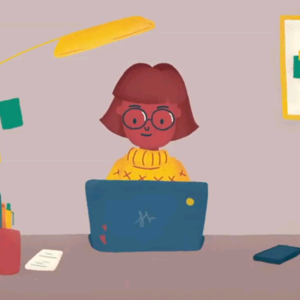Five ways to stop getting distracted | BBC Ideas
Do you ever find yourself...Do you ever find yourself trying to concentrate and you can't seem to focus? Why are we so distracted these days? And is technology the root cause of the problem, or is there something deeper going on? My name is Nir Eyal, and I've spent the last five years researching and writing about the deeper psychology of distraction.
你是否发现自己......你是否发现自己想集中精力,却似乎无法集中?为什么我们如今如此分心?科技是问题的根源,还是有更深层次的原因?我叫尼尔·埃亚尔,在过去的五年里,我一直在研究和撰写关于分心的深层心理学的内容。
When I found myself struggling with distraction, I decided to do what many people advise and got rid of the distracting technology. I got myself a flip-phone without any apps. All it did was phone calls and text messages. Then I got a word processor from the 1990s without any sort of internet connection. Unfortunately I found I still got distracted. I'd start reading a book from my bookshelf. I'd tidy up my desk. I'd take out the trash even -just to avoid the thing that I didn't want to do. I had only focused on the external triggers -the pings and dings that were leading me towards distraction.
当我发现自己在分心的问题上挣扎时,我决定像很多人建议的那样来摆脱让人分心的科技。我给自己买了一部没有任何应用程序的翻盖手机。 它只能打电话和发短信。后来,我又买了一个上世纪 90 年代的文字处理器,没有任何网络连接。不幸的是,我发现自己还是会分心。我会从书架上找本书来读。我会整理我的桌子。我甚至会去倒垃圾——只是为了逃避我不想做的事情。我只关注外部触发因素——那些让我分心的叮咚声。
What I hadn't focused on, and what turns out to be a much more common source of distraction, are the internal triggers -the uncomfortable emotional states that we seek to escape. When we're lonely, we check Facebook. When we're uncertain, we google. When we're bored, we check the news, stocks prices, sports scores -anything to not feel these uncomfortable sensations that we're not ready to experience. Here are a few techniques I discovered in my research that could help us stay on track.
1. Plan your day, but not with a to-do list)
First what you want to do is to make sure you plan your day. Two-thirds of people don't keep any sort of calendar, any kind of schedule in their day. Well the fact of the matter is if you don't plan your day, somebody is going to plan it for you. Many of us believe in this myth of the to-do list. I used to think that just by writing things down they'd get done. But of course I'd go from day to day to day recycling the bottom half of my to-do list because I wasn't making time to do those tasks. So the best place to start is not with the output of what you want to get done every day, but with the input of how much time you have to devote to every task.
2. Use social media and email at set times
So distraction has many consequences. One of them is that we find that when someone is interrupted during a task, it can take up to 20 minutes for them to refocus on what they were doing. Many times we don't even realise how much worse our output is when we...So check email in one solid block. If you enjoy using social media that's great, but make time for it in your day so it's not something you're only using every time you feel bored or lonely.
3. Surf the urge
Researchers have found that surfing the urge is an effective way to master our internal triggers. In a smoking cessation study, researchers found that when they taught smokers how to notice the sensation and be mindful of what they were experiencing, they became much more likely to stop smoking. By surfing the urge and noticing what it is that we're experiencing and allowing that sensation to crest and then subside -kind of like how a surfer might surf a wave -we allow that emotion, that uncomfortable internal trigger, to crest and then pass.
4. Beware of "liminal moments"
The next thing that we want to do is be careful of liminal moments. Liminal moments are these periods of time when we are transitioning from one task to the other. So for example if you start checking your email on the way back from a meeting and you're finally at your desk and you keep checking your email instead of getting to the task at hand, well now that liminal moment has turned into a distraction. So be careful of those times when you're transitioning from one task to the next.
5. Remember you're not powerless
A study of alcoholics found that the number one determinant of whether someone would stay sober after a rehabilitation programme was not their level of physical dependency, it wasn't what was happening in their body, in fact it was what was happening in their minds. The people who were most likely to stay sober were those who believed they had the power to stop.
So when we think that technology is hijacking our brains or it's addicting everyone, we are making it more likely that we won't be able to put technology distractions in their place. So don't believe this lie that there's nothing we can do. Clearly there's so much we can do to help make sure that we get the best out of these products without letting them get the best of us.
🌟字数限制,完整翻译、 视频版和pdf版见公众号【琐简英语】,回复"1"可进【打卡交流群】


BBC Ideas|防止分心的五种方法
4分钟 · 1548·
1548· 0
0
 1548
1548 0
0
